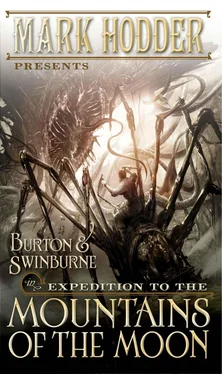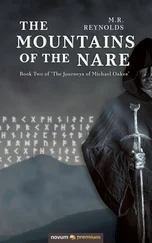Mark Hodder - Expedition to the Mountains of the Moon
Здесь есть возможность читать онлайн «Mark Hodder - Expedition to the Mountains of the Moon» весь текст электронной книги совершенно бесплатно (целиком полную версию без сокращений). В некоторых случаях можно слушать аудио, скачать через торрент в формате fb2 и присутствует краткое содержание. Жанр: sf_stimpank, на английском языке. Описание произведения, (предисловие) а так же отзывы посетителей доступны на портале библиотеки ЛибКат.
- Название:Expedition to the Mountains of the Moon
- Автор:
- Жанр:
- Год:неизвестен
- ISBN:нет данных
- Рейтинг книги:5 / 5. Голосов: 1
-
Избранное:Добавить в избранное
- Отзывы:
-
Ваша оценка:
- 100
- 1
- 2
- 3
- 4
- 5
Expedition to the Mountains of the Moon: краткое содержание, описание и аннотация
Предлагаем к чтению аннотацию, описание, краткое содержание или предисловие (зависит от того, что написал сам автор книги «Expedition to the Mountains of the Moon»). Если вы не нашли необходимую информацию о книге — напишите в комментариях, мы постараемся отыскать её.
Expedition to the Mountains of the Moon — читать онлайн бесплатно полную книгу (весь текст) целиком
Ниже представлен текст книги, разбитый по страницам. Система сохранения места последней прочитанной страницы, позволяет с удобством читать онлайн бесплатно книгу «Expedition to the Mountains of the Moon», без необходимости каждый раз заново искать на чём Вы остановились. Поставьте закладку, и сможете в любой момент перейти на страницу, на которой закончили чтение.
Интервал:
Закладка:
“What condemned man?” the housekeeper asked.
“Lieutenant John Speke,” Burke answered.
“Oh,” the old dame replied. “Him.”
She threw up her chin disapprovingly and stamped back to the kitchen.
“She blames Speke for all my ills,” Burton remarked as he put on his overcoat. He lifted his topper from its hook and suddenly remembered that more than a year ago-or, from his point of view, more than five-a bullet had been fired through it. He examined it closely and saw no sign of the two holes. In his absence, Mrs. Angell had obviously paid for its repair.
He smiled, pushed the hat onto his head, and took his silver-handled sword cane from the elephant's-foot holder by the door.
“Let's go.”
Nearly two hours later, they arrived at the Tower of London after a difficult journey in a horse-drawn growler.
“It would have been quicker to walk,” the king's agent noted.
“Yes, Captain, my apologies,” Burke replied. “The new underground railway system will solve many of the capital's ills, I hope, but I fear its opening is still some way off.”
“Has Mr. Brunel encountered problems?”
“No, sir, he's still drilling the tunnels. It's a project of immense proportions. These things take time. Isn't that so, Mr. Hare?”
“It certainly is, Mr. Burke,” Hare agreed.
They disembarked at the end of Tower Street and walked around the outer walls to the river-facing Bloody Tower Gate. The stench from the Thames was almost too much for Burton, and he snatched gratefully at the perfumed handkerchief proffered by Hare, pressing it to his nostrils. Palmerston's men appeared unaffected by the foul odour.
After a few whispered words with the Beefeater guards, the two odd-job men ushered the king's agent through the gate, across a courtyard, and into the Great Keep. They entered St. John's Chapel, and Hare opened a door in one of its more shadowy corners, indicating to Burton that he should descend the stairs beyond. The explorer did so.
Oil lamps lit the stone staircase, which went down much farther than he expected.
“You understand, Sir Richard, that the area we're about to enter is not generally known to exist and must remain a secret?” Damien Burke said.
“You can count on my discretion.”
The stairs eventually ended at a heavy metal portal. Hare produced a key and unlocked it, and the three men stepped through into a wide hallway with doors along its sides. As they walked along, Burton observed small signs: Conference Rooms 1 amp; 2; Offices A-F; Offices G-L; Administration Rooms; Laboratories 1–5; Clairvoyance Rooms 1–4; Vault; Weapon Shop; Monitoring Station; Canteen; Dormitories .
At the end of the passage, they unlocked and passed through a door marked Security. The chamber beyond was rectangular and contained filing cabinets and a desk. There were six sturdy metal doors, each numbered.
A man at the desk rose and said, “Number four, gentlemen?”
Burke nodded. He turned to Burton. “You have thirty minutes, Captain. Mr. Hare and I will wait here.”
“Very well.”
Cell 4 was opened and Burton stepped into it. The door shut behind him. He heard a key turn in its lock.
The chamber looked more like a sitting room than a prison. There were shelves of books, a desk, a bureau, a settee and armchairs, ornaments on the mantelpiece, and pictures on the wall. A door stood open to Burton's right, and John Speke stepped out from what was evidently a bedchamber.
The lieutenant was barefoot, wearing trousers and a white cotton shirt, wrinkled and untucked.
“Dick!” he exclaimed. “I'm sorry, old fellow, I had no idea it was that time already!”
“Hallo, John. How are you feeling?”
“As healthy as a condemned man can expect.” Speke waved toward the armchairs. “Come, sit down.”
As they moved across the room, he leaned in close and quietly hissed: “They'll be listening.”
Burton gave a slight nod of acknowledgement and sat down.
There was an occasional table beside Speke's chair. He took a decanter of brandy from it, poured two glasses, and handed one to his guest.
“Do you consider me guilty, Dick?”
“Absolutely not,” Burton responded.
“Good. I don't care about anyone else. But I must ask your forgiveness. A weakness in my character caused me to take umbrage with you during our exploration of Berbera, and everything we've endured since stems from that act. I thought you considered me a coward. I was angry and resentful.”
“And wrong, John. I never thought of you that way. But if it's forgiveness you need, then consider it granted.”
“Thank you.”
Hesitantly, Speke raised his glass. Burton leaned forward, clinked his own against it, and they drank.
“Do you remember all those dreadful days of illness in Ujiji?” Speke asked, referring to 1857, when they'd discovered Lake Tanganyika.
“How could I forget, John? I thought we were goners for sure.”
“When I was at my lowest ebb, you used to sit beside my cot and read to me from Camoens. Would you do so again? I'd gain much comfort from it. They allowed me a volume of The Lusiad.”
“Certainly.”
Speke stood, crossed to a bookshelf, and returned with a book in his hand. He passed it to Burton and sat down.
“I've marked a page.”
Burton nodded then opened the book where a loose leaf of paper poked out from the pages. He saw Speke's handwriting on the sheet and glanced up at his friend.
Speke met his eyes and held them a moment. His lens glinted.
Burton returned his attention to the book. He began to read aloud.
“'Ah, strike the notes of woe!' the siren cries;
‘A dreary vision swims before my eyes.
To Tagus’ shore triumphant as he bends,
Low in the dust the hero's glory ends-'”
Such was his familiarity with the Portuguese poet that he continued automatically, reciting the verse, expressively and faultlessly, though his eyes and mind were on Speke's note. He read:
Dick ,
I have told no one of what occurred in the temple. Nor have we ever spoken to each other about it, for we were in no fit condition to converse in the days subsequent to those events, and, besides, I had little recollection of anything other than a bright flash and a deafening gunshot.
But in recent days, the veil of light that blinded me seems to have lifted. What I witnessed has gained clarity in my mind, and I feel instinctively that it might be of importance to you.
I shall try to describe what happened in its proper sequence, though, in truth, these are but facets of an instant.
Dick, this thing that Darwin and his cronies attached to my head, this babbage device, contains antennae of such extreme sensitivity that they detect the electrical operations of a human brain. At the moment the brass man fired his pistol, those sensors were hit by a transmission of subtle electrical force. It was the-I'm sorry, but I know of no other way to describe it-the final mental exhalation of Mr. Trounce. This same burst of energy seemed to activate the downward-pointing pyramid above the altar. It suddenly blazed with light and lost its opacity. I was able, as if seeing through solid matter, to discern that its structure was comprised of alternating layers of material, one denser than the other.
Simultaneously, a pale-blue lightning flashed from the diamond at the tip of the pyramid and jumped to the brass man's head, then from his to yours. In the slightest fraction of a second, your appearance altered-your hair became white, your clothes changed, and a rifle appeared beside you-and the energy then reversed direction, jumping from you back to the brass man, then to the diamond.
Читать дальшеИнтервал:
Закладка:
Похожие книги на «Expedition to the Mountains of the Moon»
Представляем Вашему вниманию похожие книги на «Expedition to the Mountains of the Moon» списком для выбора. Мы отобрали схожую по названию и смыслу литературу в надежде предоставить читателям больше вариантов отыскать новые, интересные, ещё непрочитанные произведения.
Обсуждение, отзывы о книге «Expedition to the Mountains of the Moon» и просто собственные мнения читателей. Оставьте ваши комментарии, напишите, что Вы думаете о произведении, его смысле или главных героях. Укажите что конкретно понравилось, а что нет, и почему Вы так считаете.












